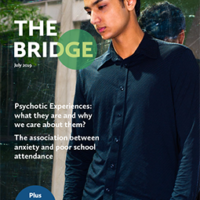ACAMH Website Content Types
-

In Conversation… Prof. Cathy Cresswell – Anxiety and ‘Emerging Minds’
Cathy Cresswell, Professor of Clinical Psychology, University of Oxford discusses anxiety and ‘Emerging Minds’ – action for child mental health.
Read more -

In Conversation… Fetal Alcohol Spectrum Disorder (FASD)
Dr. Jennifer Shields & Dr. Sarah Brown discuss Fetal Alcohol Spectrum Disorder (FASD), the most common preventable non-genetic cause of neurodevelopmental disorders in the UK.
Read more -

Psychological resilience in young people
Having spent a lot of time on a camp bed in a paediatric ward with young people and their families, some of whom were inpatients for weeks on end and facing huge physical challenges, it has made me wonder a great deal about the elements of psychological resilience in young people.
Read more -

Psychotic Experiences: what they are and why we care about them?
Over the past 20 years, findings from the field of psychosis research have shed new light on the prevalence of PEs among children and adolescents, revealing that about 17% of children and 8% of adolescents report experiences of these phenomena.
Read more -

The association between anxiety and poor school attendance
School plays a key role in children’s development, and frequent absence from school increases the likelihood of a range of adverse outcomes in childhood and later life. This includes poor academic performance, social isolation, economic deprivation and unemployment in adulthood. There are many risk factors for frequent school absence, including factors related to the child and their family, school and community.
Read more -

A theory of youth mental health recovery
Mental health disorders have a negative impact on the individual, society and global economy. The prevalence of mental disorders is increasing in young people, and if unaddressed, research has shown that they may develop into severe and chronic illnesses. Despite this, research into youth mental health recovery is limited.
Read more -

The experiences of healthcare transitions between child and adult services for young people with attention deficit hyperactivity disorder: a review of evidence
Attention deficit hyperactivity disorder (ADHD) is characterised by hyperactivity, inattention and impulsivity. It affects around 5% of children, and can be a long term condition, with research showing that up to two thirds of young people with ADHD will continue to experience symptoms into adulthood. However, many young people with ongoing healthcare needs do not make the necessary transition from child to adult mental health services.
Read more -

In Conversation… Digital Interventions with Dr. Bethan Davies & Dr. Aislinn Bergin
In this podcast on Digital Interventions, Dr. Bethan Davies & Dr. Aislinn Bergin, of NIRH Mindtech, talk to freelance journalist Jo Carlowe about how these innovations can have a positive effect on young people’s mental health.
Read more -

In Conversation… Parenting – Prof. Judy Hutchings & Dr. Margiad Williams
What is harsh parenting? What are the latest interventions? Plus what’s in the pipeline?
Read more
All this and more detailed in this podcast with Prof. Judy Hutchings & Dr. Margiad Williams, both Bangor University. -

Reporting of depression symptoms in children with ADHD: do parents know best?
ADHD is a common neurodevelopmental disorder characterised by hyperactive-impulsiveness and inattention. ADHD often co-occurs with emotional disorders such as depression and anxiety. Depression in particular is prominent amongst adolescents with ADHD, and can be difficult to identify as it can have similar features both to ADHD itself and to some of the side effects of ADHD medication.
Read more